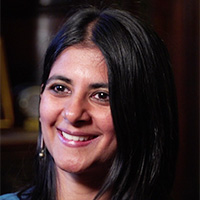By Kavita Ramanan
We live in a very unequal world. For me, this is an axiom — its numerous corollaries influence our daily decisions in both explicit and more subtle ways. Despite being a minority in science, technology, engineering, and mathematics (STEM), I am also fully aware of my privileges. Had I been born in a less supportive and resourceful environment—even a few miles from where I grew up—my trajectory would likely have been quite different. I thus view the outcome of my (somewhat random) career path as a truly wonderful opportunity to engage with the broader community, both through my research and other efforts. In particular, I believe that the axiom of inequality is not immutable; as with quantum theory, greater awareness could perhaps help change reality.
The spring session of the Social Equity and Applied Math (SEAM) virtual seminar series is currently underway.
The events of 2020 have inspired much discussion about issues that concern racial and other inequities, and I was frequently surprised that the widespread prevalence of injustice was a revelation to many. With this observation in mind, I initiated the
Social Equity and Applied Math (SEAM) virtual seminar series in the fall of 2020. The series aims to generate broader awareness of varied issues that are relevant to social equity in the world; explore the mathematical models and quantitative approaches that researchers use to study these issues; and potentially stimulate new directions for applied and computational mathematics, interdisciplinary research and fundamental mathematical theory. The program has received a tremendous response, drawing researchers from diverse disciplines that include computer science and economics in addition to mathematics. This reception is mainly due to the stellar cast of speakers and the significant organizational help and enthusiasm of several graduate students at Brown University’s Division of Applied Mathematics.
The first speaker in the fall seminar series was Timnit Gebru, then a senior research scientist at Google who was co-leading the “Ethical Artificial Intelligence” research team. She spoke about the (potentially flawed) use of current computer-vision based technologies, as well as the biases inherent therein. Those who want to learn more about the pitfalls of human and machine facial recognition may also want to watch John Oliver’s Last Week Tonight's episode on “Facial Recognition,” which also features Gebru, and the “Thomas Haynesworth” episode of Netflix’s The Innocence Files.
Next, Karen Smilowitz of Northwestern University provided a broad review of the way in which early analytical approaches to school desegregation—motivated by Supreme Court decisions to desegregate schools in the 1950s and 1960s—utilized concurrent advances in linear programming. She then outlined new challenges currently faced by public school districts and described some of her own research efforts to address them by leveraging modern advances in optimization.
Smilowitz’s presentation was followed by Jonathan Mattingly of Duke University, whose lecture served as a more technical supplement to his public lecture at ICERM on the quantification of gerrymandering. His seminar talk elaborated on the use of Markov chain Monte Carlo methods for sampling redistricting maps and detecting gerrymandering.
The SEAM seminars invoked a broad range of mathematics and social justice issues. Rediet Abebe, a Junior Fellow at the Harvard Society of Fellows and an incoming assistant professor of computer science at the University of California, Berkeley, illustrated how even simple stochastic process models can provide intuition into the impacts of shocks on poverty and inform mitigation strategies. Her talk raised several interesting open questions in the realm of both mathematics and public policy.
The fall series concluded with an engaging session by Sharad Goel of Stanford University, who described statistical methods that define, detect, and combat bias in human and machine decisions. His lecture drew on empirical data from various sectors, including law enforcement and the justice system.
The spring SEAM series is also off to a rousing start. A few weeks ago, Jon Kleinberg of Cornell University gave a wonderful overview of research on fairness and bias in algorithmic decision-making. This presentation is a must-watch for anyone who is involved with a hiring or admissions committee. The next seminar, “Unavoidable Tensions in Explaining Algorithmic Decisions” will be delivered by Solon Barocas of Microsoft Research and Cornell University on March 17. The spring series will conclude on April 7 with a seminar by Irene Lo from Stanford University, who will address efficient and equitable assignment of students to public schools.
I hope that this series will be of interest to a larger community of researchers and help draw more diverse undergraduate and graduate students to the mathematical sciences. Further information about the series is available online.
Acknowledgments: Darryl Xie is a second-year graduate student at Brown University and a co-organizer of the SEAM seminar.
 |
Kavita Ramanan is the Roland George Dwight Richardson University Professor of Applied Mathematics at Brown University. Her research interests lie in the area of probability theory, stochastic processes, and their applications. She is a recipient of a Guggenheim Fellowship, the Newton Award, a Simons Fellowship, and the Erlang Prize, and is also an elected Fellow of several societies — including SIAM and the American Mathematical Society. Ramanan is passionate about communicating mathematics to broader audiences and runs a math outreach group at Brown called the Math CoOp. |